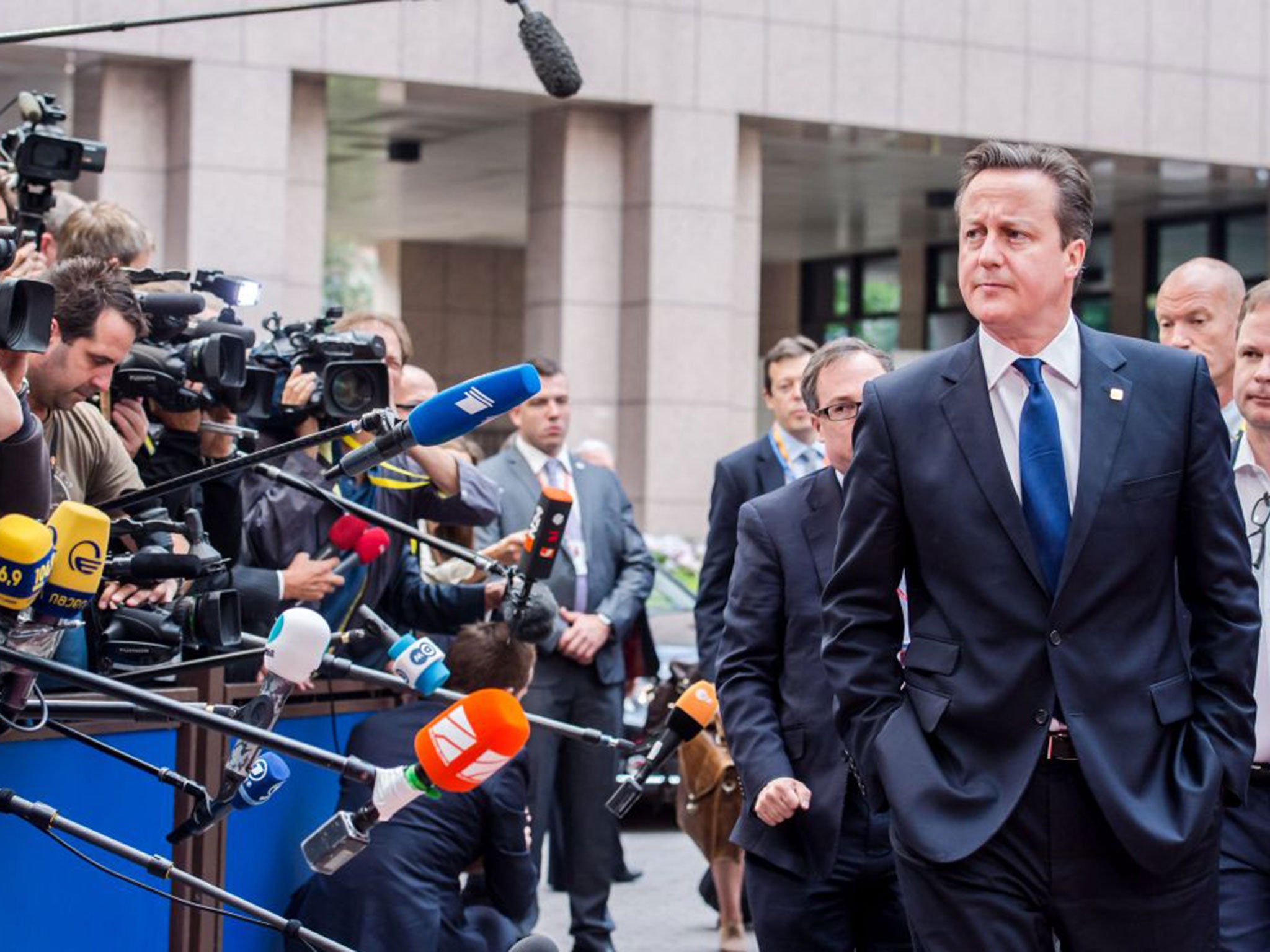David Cameron 'has no negotiating hand to speak of' in Brussels, claims Nigel Lawson
Ex-chancellor criticises the Prime Minister's handling of the EC president's election

David Cameron's woes over Europe deepened last night after a senior member of Margaret Thatcher's Cabinet said the current Prime Minister had thrown away his entire negotiating hand in Brussels.
Former chancellor Nigel Lawson, in an interview with The Independent on Sunday, said Mr Cameron should have threatened to campaign for Britain to leave the EU as a way of strengthening his negotiating position with fellow European leaders. Instead, the Prime Minister had "made it quite clear that he doesn't want to exit … so he has no negotiating hand to speak of", Lord Lawson said.
The withering criticism will add to the pressure on Mr Cameron following the election of Jean-Claude Juncker, an arch-federalist opposed only by Britain and Hungary, as European Commission president by an overwhelming majority of European leaders in Brussels on Friday. The Prime Minister has admitted that it would now be a tougher fight to persuade British voters to remain in the EU in the 2017 referendum. With Mr Juncker triumphant, Mr Cameron also faces a difficult task negotiating a new relationship with Brussels.
The Swedish Prime Minister, Fredrik Reinfeldt, said yesterday that there was now concern that Britain would quit the EU – in a sign that Lord Lawson's strategy to threaten to leave would have worked.
Ed Miliband claimed Mr Cameron's handling of the election posed a "clear and present danger" to the British economy, which he said would undermine three million jobs in this country dependent on membership of the EU. The Labour leader will attempt this week to shift the focus from Europe on to the economy. This includes backing a proposal by Lord Adonis for £6bn of Whitehall expenditure to be distributed among the regions – treble the current amount pledged by the coalition.
Yesterday, cabinet ministers rushed to support Mr Cameron amid headlines declaring that Britain was closer to the EU exit door. Jeremy Hunt, the Health Secretary, described the Prime Minister as "brave" to tackle the status quo in Europe. Philip Hammond, the Defence Secretary, said Mr Cameron had shown reform was "not just for Britain's sake, but for the sake of all the people of Europe".
Even if Mr Cameron wins the election and instructs his Cabinet to back him in campaigning to remain in the EU, some Tory figures were suggesting that some Eurosceptic ministers would rebel and campaign for Britain to leave, causing a damaging split in a Conservative government.
Lord Lawson was speaking to The IoS before last week's vote on Mr Juncker, but on the wider issue of Mr Cameron's ability to renegotiate Britain's membership of the EU ahead of a referendum in 2017.
Asked whether the Prime Minister could threaten to withdraw in the run-up to the referendum, Lord Lawson said: "Yes, but he hasn't. That is what's surprising, that he's made it quite clear that he doesn't want to exit, which doesn't strengthen his negotiating hand …. If David Cameron had said, 'Well, I'm not sure how to vote. It depends on what I am able to negotiate', that would have been a stronger hand. But he's actually made it clear he's going to vote for 'in' irrespective, so he has no negotiating hand to speak of."
The former chancellor, who is close to George Osborne, compared Mr Cameron's position with the last time British membership of the EU was last put to a referendum. "[Cameron] might do a Harold Wilson – whether the public will believe it as they did in 1975 is another matter. What Harold Wilson did, and David Cameron is following in his footsteps, he said that he didn't agree with the terms that Ted Heath had negotiated, he was going to renegotiate the terms and then he put it to the people in a referendum. Through the long renegotiation, we got absolutely damn all – indeed, I doubt there's anyone alive today who can remember what he did get out of it, it was so trivial – but he presented it as a great success, and people bought it. I think David Cameron could try to do the same; he will get very little and he will present it as something."
The Financial Times reported that, following talks in Sweden earlier this month with Angela Merkel, the German Chancellor, Mr Reinfeldt and Dutch Prime Minister Mark Rutte, Mr Cameron considered a change in strategy by threatening to campaign for Britain to leave. Mr Cameron, Mr Osborne and Foreign Secretary William Hague discussed bringing forward the 2017 referendum, or even threatening that Britain would campaign to leave unless he got what he wanted, the FT reported.
Mr Miliband said: "David Cameron and the Conservative Party now pose a clear and present danger to our economy. The choice is between Labour which would win the argument and build alliances for reform or David Cameron who by his own admission is taking the country towards the exit door, threatening three million jobs across the UK."
Ukip leader Nigel Farage said Mr Cameron was now in an impossible position to negotiate Britain's relationship with Brussels.
A Downing Street spokesman said that after Mr Cameron vetoed EU treaty change in 2011, commentators had called it a crisis for the Prime Minister, adding: "Since then we have formed alliances to cut the EU budget for the first time in history."
Subscribe to Independent Premium to bookmark this article
Want to bookmark your favourite articles and stories to read or reference later? Start your Independent Premium subscription today.

Join our commenting forum
Join thought-provoking conversations, follow other Independent readers and see their replies